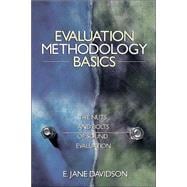
Note: Supplemental materials are not guaranteed with Rental or Used book purchases.
Purchase Benefits
What is included with this book?
| What is Evaluation? | |
| Basic Definitions | |
| A Note About Fitting Evaluation Approach to Purpose | |
| The Steps Involved | |
| The Ingredients of a Good Evaluation | |
| Identifying the Evaluand | |
| Additional Readings | |
| Exercises | |
| Defining the Purpose of the Evaluation | |
| Evaluations for Determining Overall Quality or Value | |
| Evaluations for Finding Areas for Improvement | |
| Questions About Absolute vs. Relative Quality/Value | |
| Summary and Final Comments | |
| Additional Readings | |
| Exercises | |
| Identifying Evaluative Criteria | |
| Why Not Just Use Goals? | |
| Identifying Criteria: Basic Concepts and Tools | |
| Conducting a Needs Assessment | |
| Identifying Other Relevant Criteria | |
| Additional Readings | |
| Exercises | |
| Organizing the Criteria & Identifying Potential Sources of Evidence | |
| The Importance of Choosing Multiple Sources of Quality Evidence | |
| The Process Evaluation Checkpoint | |
| The Outcome Evaluation Checkpoint | |
| The Comparative Cost-Effectiveness Checkpoint | |
| The Exportability Checkpoint | |
| Additional Readings | |
| Exercises | |
| Dealing With the Causation Issue | |
| Certainty about causation | |
| Inferring causation: Basic principles | |
| Inferring causation: Seven strategies | |
| Choosing a blend of methods to address the causation issue | |
| Additional Readings | |
| Exercises | |
| "Values" in Evaluation | |
| The Controversy | |
| The Three Types of Subjectivity | |
| The Tensions Between Subjectivism and Common Sense | |
| Where do the "Values" in an Evaluation Come From? | |
| Additional Readings | |
| Exercises | |
| Determining Importance | |
| Determining Importance: What and Why | |
| Determining Importance: Six Strategies | |
| Additional Readings | |
| Exercises | |
| The Merit Determination Step | |
| Determining Merit: What and Why | |
| Using Rubrics for Determining "Absolute" Merit | |
| Using Rubrics for Determining "Relative" Merit | |
| Making practical use of merit determination rubrics | |
| Additional Readings | |
| Exercises | |
| Synthesis Methodology | |
| Synthesis: What and Why | |
| The Role of Costs and Comparisons in Synthesis | |
| Synthesizing for "Grading" | |
| Synthesizing for "Ranking" | |
| Additional Readings | |
| Exercises | |
| Putting it All Together | |
| The KEC Preliminary Checkpoints | |
| The KEC Foundations Checkpoints | |
| The KEC Subevaluations Checkpoints | |
| The KEC Conclusions Checkpoints | |
| Additional Readings | |
| Meta-Evaluation | |
| The five criteria for evaluating evaluations | |
| Key points to remember in meta-evaluation | |
| Other options for conducting a meta-evaluation | |
| Formative meta-evaluation | |
| Should I use meta-evaluation myself? | |
| Additional Readings | |
| Exercises | |
| Answers to Selected Exercises | |
| Sample Exam Questions | |
| Tips for students answering these exam questions | |
| The questions | |
| A rubric for grading assignment and exam answers | |
| Suggested answers to practice exam questions | |
| Glossary | |
| References | |
| Table of Contents provided by Ingram. All Rights Reserved. |
The New copy of this book will include any supplemental materials advertised. Please check the title of the book to determine if it should include any access cards, study guides, lab manuals, CDs, etc.
The Used, Rental and eBook copies of this book are not guaranteed to include any supplemental materials. Typically, only the book itself is included. This is true even if the title states it includes any access cards, study guides, lab manuals, CDs, etc.